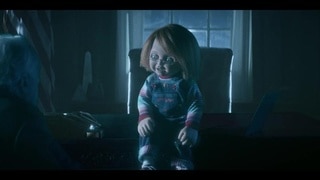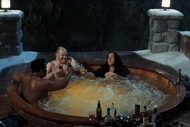Create a free profile to get unlimited access to exclusive videos, sweepstakes, and more!
The Jury Is In, Loneliness Is Deadly
Like, super deadly!
Renfield — streaming now on Peacock! — turns the lens away from Dracula (Nicolas Cage) and towards a supporting character in the titular R.M. Renfield (Nicholas Hoult). In the early 20th century, Renfield meets with the Count, in the hope of locking down a land deal that would change his life. Instead, he lands a gig as Dracula’s unpaid intern. The hours are brutal, and the work is grueling, but the healthcare benefits are unmatched, as long as you’re willing to switch to an all-bug diet.
After almost a century of doing Dracula’s dirty work, Renfield has had enough. Everyone he has ever known or cared about is dead, and his only relationship (with the prince of darkness himself) isn’t exactly high quality. Renfield is lonely, socially isolated, and in trouble. Hanging out with Dracula is dangerous business no matter who you are, but loneliness and isolation are the real killers, according to a recent study published in the journal Nature Human Behavior.
Loneliness is as deadly as smoking a pack of cigarettes a day
There’s an intuitive connection between loneliness, isolation, and negative health outcomes. Even without data it seems almost obvious that being alone would contribute to a poorer quality of life and an earlier demise. Despite that, scientists have spent decades studying the impact of loneliness and come up with some conflicting results. While some studies have shown a clear connection, others have shown the opposite or been inconclusive.
RELATED: You Should Get Out More, Because Being Alone For Too Long Will Literally Shrink Your Brain
Now, researchers have completed a meta-analysis of 90 related studies, with a total participant population of more than 2.2 million individuals. Study populations were made up of the general public, as well as groups of individuals being treated for cancer or cardiovascular disease. Healthcare outcomes were tracked for between 6 months and 25 years. This cumulative analysis demonstrates a clear relationship between loneliness, social isolation, and risk of “all-cause” death. That outcome was true whether you had existing pathology or not.
For the purposes of the study, loneliness was defined as the subjective distress experienced when there is a disparity between the quality of social relationships you have and the quality of social relationships you want. Social isolation, by contrast, is defined as an objective lack of contact with other people, limited social networks, or solitary living conditions.
Both of these conditions, social isolation and loneliness, correlated to a statistically significant increased risk of early death. These findings were perhaps unsurprising for cancer and cardiovascular disease patients. Previous studies have demonstrated a link between social support and health outcomes. Although it is unclear which condition causes the other. Poor social support might drive poor outcomes, but poor health might also drive a decline in support when patients need it most.
Likewise, the driving factor among the general population is also unclear. Poor health might result in fewer high-quality relationships, or a lack of relationships could drive unhealthy behaviors leading to increased health risks. What is clear is that the relationship exists. The study found that people who reported loneliness were, on average, 14% more likely to die early than their peers. Meanwhile, participants who were socially isolated were 32% more likely to die early.
This comes on the heels of an advisory on the importance of social connection from the surgeon general, which compares the health impact of social isolation to that of smoking 15 cigarettes a day. The advisory also states that roughly half of adults in the United States report feeling lonely, making social isolation a considerable public health problem. But it’s one we can hopefully overcome, with a little help from our friends.
See what a toxic relationship looks like, and one way to get out of them, in Renfield, streaming now on Peacock.



















